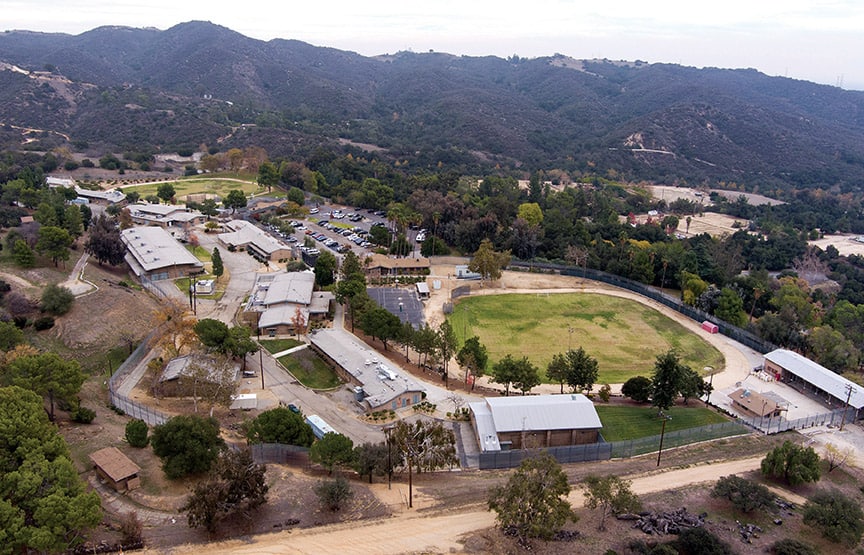Plan to house youth offenders in La Verne scrapped

The Los Angeles County Board of Supervisors voted to move forward with a plan to house serious youth offenders at county probation camps but will not be sending any inmates to camps Afflerbaugh and Paige in La Verne. COURIER photo/Peter Weinberger
by Steven Felschundneff | steven@claremont-courier.com
A controversial proposal by Los Angeles County probation officials to house youths convicted of serious crimes in two camps on Claremont’s northwestern border was shelved by the Los Angeles County Board of Supervisors on Tuesday.
The supervisors voted 4-1 to move forward with a program to house youths convicted of crimes including murder, rape and arson in camp-like rehabilitation facilities, but decided not to send the offenders to camps Paige and Afflerbaugh in the hills above La Verne. Another local facility, Camp Glenn Rockey in San Dimas, was also dropped from consideration.
“It’s a big win for the city of La Verne. We are not a NIMBY city, with not only Paige and Afflerbaugh, but also [youth facilities] Leroy Haynes and David and Margaret. But we are ecstatic this is not going to be built here,” La Verne Mayor Tim Hepburn said on Wednesday.
He credited the work that the city and its residents put into the effort of opposing bringing the violent offenders to La Verne, and also thanked supervisors Hilda Solis and Kathryn Barger, who represent the area, for lobbying on his city’s behalf.
Bringing the youth offenders to La Verne sparked strong resistance from residents of both La Verne and Claremont, who said camps Paige and Afflerbaugh were too close to “hundreds of homes and thousands of people” to safely house violent offenders. They expressed concerns that it would be impossible to make the facilities secure enough to ensure that no one ever escaped from the camps.
The supervisors approved the creation of three “secure youth track facilities” at Camp Kilpatrick in Malibu and Camp Scott in Santa Clarita for male offenders, as well as Camp Kirby in Commerce for female offenders.
Supervisor Barger, who now represents Claremont, was the lone no vote. She favored a solution that would have made improvements to Barry J. Nidorf Juvenile Hall over sending youth to the camps, including Camp Scott, which is also in her district.
“Selecting Camp Scott over Barry J. Nidorf contradicted experts from the probation department, whose detailed proposal concluded that Nidorf was the most appropriate setting,” Barger said in a statement “It contradicted a solution that made the most fiscal sense. Since our county is already legally required to transform Nidorf, we could’ve leveraged those improvements to create a state-of-the-art rehabilitative facility for these youth.”
The supervisors’ action continues a process called “realignment” set in motion by a pair of state laws that dissolves the California Division of Juvenile Justice and closes state-run juvenile prisons by June 30, 2023. The changes are part of an effort to focus on education and social services instead of incarceration for these offenders.
As part of realignment, each of California’s 58 counties will be responsible for housing 707b youth offenders, those convicted of crimes such as murder, attempted murder, arson, kidnapping and rape, among other serious offenses.
The law also creates a new state office of Youth and Community Restoration to oversee the realignment effort, and establishes a Juvenile Justice Realignment Block Grant program to provide the needed funds for the counties.
Camps Paige and Afflerbaugh were among roughly a half dozen county sites considered for security and site upgrades to safely house a portion of the approximately 150 youth offenders the county must absorb when realignment is complete.
Camp Kilpatrick, which will house some of the youth offenders, underwent a $53 million renovation making it a test case for the “L.A. model” of rehabilitation which seeks in part to get youth offenders out of prison-like settings and into more holistic environments.
Supervisor Sheila Kuehl, who cosponsored the motion, called Barry J. Nidorf Juvenile Hall an “adult prison” and not a place where the county’s young people should be housed for a long period of time.
In her statement, Supervisor Barger said L.A. County was taking a very different approach to realignment than most counties in the state that planned to convert juvenile halls into secure track youth facilities.
“They’re taking active steps to constrain their juvenile justice footprint in their communities. A majority of our board members felt the need to do the opposite and expand it,” she said.
Camp Scott, which formerly held female offenders, has been closed since 2020 but can house 110 youth. Before that can happen it will need extensive work to make it a safe place for the youth and for the local community.
“In the days and weeks ahead, I will be vigilant. I will closely review forthcoming plans to remodel Camp Scott. I’ve been clear and will continue to emphasize that it needs significant investments inside and outside, including extensive security upgrades, before it can serve any youth,” Supervisor Barger said.










0 Comments